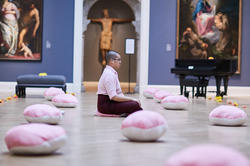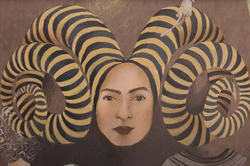Winning 2020 proposals for RISD Museum installations on hold since last March are finally coming to fruition.
Astrophysicist Earns Dorner Prize

Although the RISD Museum’s annual Dorner Prize competition has included a digital component in recent years, due to the pandemic, the 2021 entries were required to be entirely virtual. That aspect of the competition caught the eye of this year’s winner, Digital + Media grad student Jack Madden MFA 22 DM, whose online project, Complete Definitions, is on view through next June on the museum’s website.
“This opportunity invites RISD students to create new installations, performances, programs or digital encounters that engage the public in critical explorations within and beyond the museum,” says Interim Director Sarah Ganz Blythe. “Jack’s incredible visual renderings examine English words in a way that reminds us of the fundamentally recursive nature of language.”

Madden is pursuing his MFA at RISD after completing a PhD in astrophysics at Cornell University. Complete Definitions, like most of his artwork, repurposes scientific tools and mathematical algorithms to artistic ends. “I got into astrophysics in order to understand our place in the universe,” he explains, “and I see my artistic practice as a continuation of those same questions.”
“I got into astrophysics in order to understand our place in the universe, and I see my artistic practice as a continuation of those same questions.”
He used a programming language called Mathematica to investigate the words he selected for the Dorner Prize project, which is ultimately about “showing the way language is connected and closed. I started with the word meaning as defined in the Oxford English Dictionary and then defined each of the words in its definition, and then each of those words,” he explains. The code creates ultra-high-resolution digital renderings and animations for each word that map the hierarchical structures of their definitions.

“I picked words like rational, authentic and morality, whose meanings depend primarily on context,” says Madden. “These words are particularly fragile and become useless when roughly handled. The work is a call to action to use them more carefully and with awareness of their humanity.”
Having an understanding of physics has helped Madden problem-solve in many of his other projects as well. “The scientific process has given me a great toolkit to pull from when I approach a piece—materials testing, running physics simulations, referencing scientific articles—which adds a unique style to my work and documentation,” he says.

Books for Robots (only), for example, one of Madden’s first assignments when he began his MFA, set out to examine our changing relationship with AI. “I thought about slowing down and reading a book as this human experience we really value,” he explains. “Could a future robot ever feel the need to read a book rather than just downloading the content? When we have complete control over its value system, how do we decide what an AI should prefer?” He created a physical book incorporating the text from Frankenstein, The Policeman’s Beard Is Half Constructed and Thus Spake Zarathustra made up entirely of scannable QR codes.
“Could a future robot ever feel the need to read a book rather than just downloading the content?”
The project went over extremely well in critique. “I’ve been amazed by how open the faculty and other students are to my work,” says Madden. “When I was looking into art school, RISD’s Digital + Media department stuck out as a program where I can explore liminal ideas mixing science and art.”

“We’re faced with all these questions we don’t have answers to in daily life,” he adds. “Building a cosmic view of our place in the universe has helped me find perspective, and I’m trying to share that in ways only art can.”
—Simone Solondz
Visit Madden’s Complete Definitions project online and explore the code he used to create it here.
December 13, 2021


